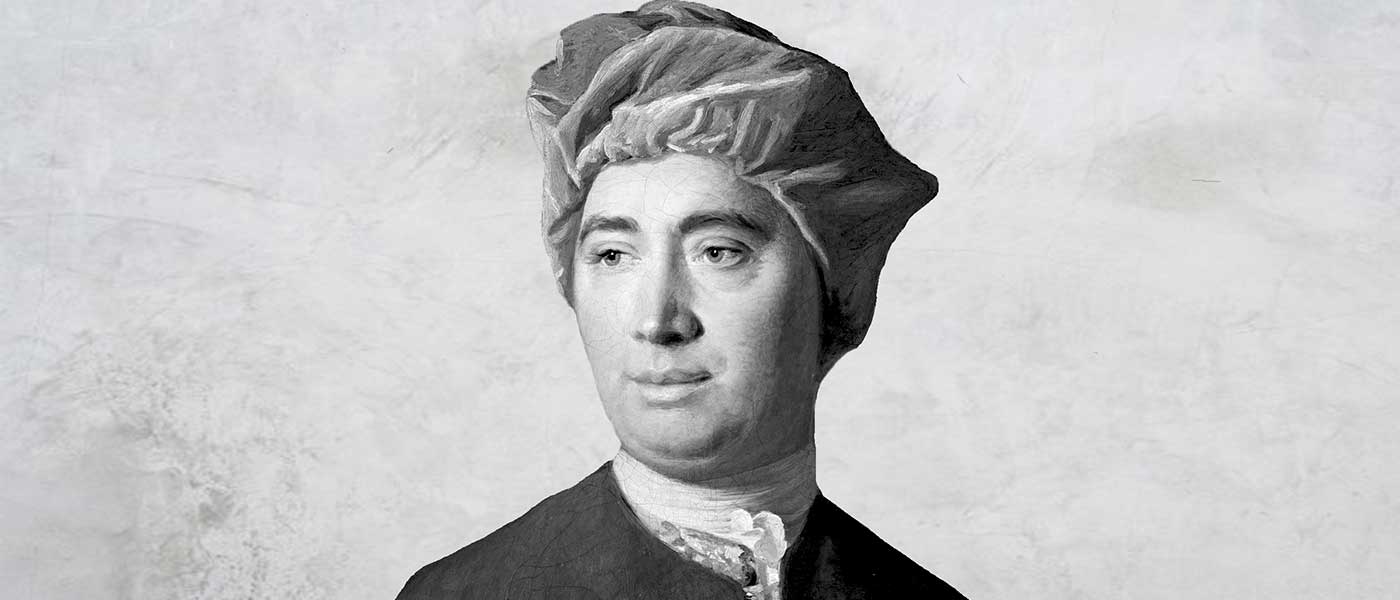
There are few philosophers whose work has ranged over such vast territory as David Hume (1711—1776).
If you’ve ever felt underappreciated in your time, let the story of David Hume console you: despite being one of the most original and profound thinkers of his or any era, the Scottish philosopher never held an academic post. Indeed, he described his magnum opus, A Treatise of Human Nature, as falling “stillborn from the press.” When he was recognized at all during his lifetime, it was primarily as a historian – his multi-volume work on the history of the British monarchy was heralded in France, while in his native country, he was branded a heretic and a pariah for his atheistic views.
Yet, in the many years since his passing, Hume has been retroactively recognised as one the most important writers of the Early Modern era. His works, which touch on everything from ethics, religion, metaphysics, economics, politics and history, continue to inspire fierce debate and admiration in equal measure. It’s not hard to see why. The years haven’t cooled off the bracing inventiveness of Hume’s writing one bit – he is as frenetic, wide-ranging and profound as he ever was.
Empathy
The foundation of Hume’s ethical system is his emphasis on empathy, sometimes referred to as “fellow-feeling” in his writing. Hume believed that we are constantly being shaped and influenced by those around us, via both an imaginative, perspective-taking form of empathy – putting ourselves in other’s shoes – and a “mechanical” form of empathy, now called emotional contagion.
Ever walked into a room of laughing people and found yourself smiling, even though you don’t know what’s being laughed at? That’s emotional contagion, a means by which we unconsciously pick up on the emotional states of those around us.
Hume emphasised these forms of fellow-feeling as the means by which we navigate our surroundings and make ethical decisions. No individual is disconnected from the world – no one is able to move through life without the emotional states of their friends, lovers, family members and even strangers getting under their skin. So, when we act, it is rarely in a self-interested manner – we are too tied up with others to ever behave in a way that serves only ourselves.
The Nature of the Self
Hume is also known for his controversial views on the self. For Hume, there is no stable, internalised marker of identity – no unchanging “me”. When Hume tried to search inside himself for the steady and constant “David Hume” he had heard so much about, he found only sensations – the feeling of being too hot, of being hungry. The sense of self that others seemed so certain of seemed utterly artificial to him, a tool of mental processing that could just as easily be dispatched.
Hume was no fool – he knew that agents have “character traits” and often behave in dependable ways. We all have that funny friend who reliably cracks a joke, the morose friend who sees the worst in everything. But Hume didn’t think that these character traits were evidence of stable identities. He considered them more like trends, habits towards certain behaviours formed over the course of a lifetime.
Such a view had profound impacts on Hume’s ethics, and fell in line with his arguments concerning empathy. After all, if there is no self – if the line between you and I is much blurrier than either of us initially imagined – then what could be seen as selfish behaviours actually become selfless ones. Doing something for you also means doing something for me, and vice versa.
On Hume’s view, we are much less autonomous, sure, forever buffeted around by a world of agents whose emotional states we can’t help but catch, no sense of stable identity to fall back on. But we’re also closer to others; more tied up in a complex social web of relationships, changing every day.
Moral Motivation
Prior to Hume, the most common picture of moral motivation – one initially drawn by Plato – was of rationality as a carriage driver, whipping and controlling the horses of desire. According to this picture, we act after we decide what is logical, and our desires then fall into place – we think through our problems, rather than feeling through them.
Hume, by contrast, argued that the inverse was true. In his ethical system, it is desire that drives the carriage, and logic is its servant. We are only ever motivated by these irrational appetites, Hume tells us – we are victims of our wants, not of our mind at its most rational.
Reason is, and ought only to be the slave of the passions and can never pretend to any other office than to serve and obey them.
At the time, this was seen as a shocking inversion. But much of modern psychology bears Hume out. Consider the work of Sigmund Freud, who understood human behaviour as guided by a roiling and uncontrollable id. Or consider the situation where you know the “right” thing to do, but act in a way inconsistent with that rational belief – hating a successful friend and acting to sabotage them, even when on some level you understand that jealousy is ugly.
There are some who might find Hume’s ethics somewhat depressing. After all, it is not pleasant to imagine yourself as little more than a constantly changing series of emotions, many of which you catch from others – and often without even wanting to. But there is great beauty to be found in his ethical system too. Hume believed he lived in a world in which human beings are not isolated, but deeply bound up with each other, driven by their desires and acting in ways that profoundly affect even total strangers.
Given we are so often told our world is only growing more disconnected, belief in the possibility to shape those around you – and therefore the world – has a certain beauty all of its own.
Ethics in your inbox.
Get the latest inspiration, intelligence, events & more.
By signing up you agree to our privacy policy
You might be interested in…
Opinion + Analysis
Health + Wellbeing, Relationships
James Hird In Conversation Q&A
Opinion + Analysis
Business + Leadership, Relationships, Society + Culture
Renewing the culture of cricket
Explainer
Politics + Human Rights, Relationships
Ethics Explainer: The Harm Principle
Opinion + Analysis
Health + Wellbeing, Relationships




